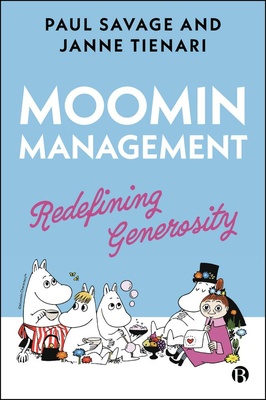Sustainability and responsibility are corporate buzzwords, and now that the globe is in deep crisis, management scholars are devoting attention to organisations that claim to act sustainably and responsibly. The Moomin business is one such ecosystem of companies that focuses on its ability to do good. The business emphasises its desire to bring people comfort and joy and its management style is characterised by generosity.
Moomin generosity is grounded in a specific heritage. Moomins are troll creatures with pear-shaped faces who live with their friends in Moominvalley. The Swedish-speaking Finnish artist and writer Tove Jansson created the first Moomin images and stories in the 1940s, which were soon adapted into comic strips and animation films. Jansson’s work continues to convey a powerful message of equality and friendship that is sorely needed in today’s world characterised by violence and sadness. The Moomins are on the side of those who are small and vulnerable. Everyone is different, and everyone is accepted as they are. The Moomin philosophy is rooted in love, tolerance and adventure.
Moomin is also about positive rebellion. Rebels are part of the fabric of the story, and they blend into the community. Respecting difference comes with some edge, and delicate balancing acts between conformity and resistance can be found throughout the Moomin stories. Things do not always play out neatly, and the Moomins deal with a variety of hardships and emotions in their adventures. Despite struggles, together they solve the problems they encounter. They deal with loneliness and injustices in ways that we can recognise and identify with.
Tove Jansson’s art and philosophy are reflected in how the Moomin business is managed today. The business ecosystem revolves around Moomin Characters, a company that has a hand in thousands of products across the world and trades in Moomin copyright and registered trademarks. In Moomin Management, we unveil the Moomin business management journey, from Jansson’s creations to a global art-based brand and a growing ecosystem of companies. Emphasising generosity as a key management principle, we champion caring for people as vital for a thriving organisation. Generosity shapes the Moomin ethos, underpinning not just the brand, but also strategic partnerships and engagement with new technologies and the virtual world.
Generosity can be found in the original Moomin stories, and it is characteristic of how the Moomin business ecosystem functions and is managed. It is about taking care of people and showing respect and deference, albeit sometimes with prickly humour. In promoting generosity there is a danger of slipping into self-management techniques and mindfulness exercises and losing sight of the context that enables and gives meaning to generosity. In our book, we steer clear of individualistic understandings and argue that generosity lies between individuals. It emerges and finds meaning in given circumstances and conditions, and it is impossible to carve out and measure on its own. Sometimes it leads to great things, but it can also fail and disappoint, as we see happening at times in the Moomin ecosystem.
Our book is about how generosity emerges in relations and interactions between people – and between people, spaces and technologies. Generous management is about creating conditions that enable and give rise to acts of generosity. Benefitting (or not) from being recognised as generous is related to how others view generous acts.
So, sustainability and responsibility are not mere buzzwords at Moomin. Doing good by bringing people comfort and joy has turned into a business with a global annual retail value of close to a billion euros. It is about managing the Moomin brand and attempting to coordinate all the different and often passionate connections people (consumers and licensees) have with Moomin (its creators and business decision makers). Key stakeholders make sure Moomin does not stray from Tove Jansson’s art and legacy. This leads to delicate balancing acts in managing a global brand while staying true to its roots. It is about keeping the magic in a cut-throat entertainment business where passion is easily diluted and where only money seems to matter for big players.
The Moomin way offers a fresh and positive perspective on business and management today. When the environment and humankind are facing unprecedented challenges, and we are surrounded by sadness and grief, managing with generosity is as timely and relevant as it ever was. Moomin offers a powerful example of this. Doing good can be good business, and good business can be about doing good.
Paul Savage is Assistant Professor in Entrepreneurship at United Arab Emirates University. Janne Tienari is Professor of Management and Organisation at Hanken School of Economics.
 Moomin Management by Paul Savage and Janne Tienari is available on Bristol University Press for £19.99 here.
Moomin Management by Paul Savage and Janne Tienari is available on Bristol University Press for £19.99 here.
Bristol University Press/Policy Press newsletter subscribers receive a 25% discount on our books – sign up here.
Follow Transforming Society so we can let you know when new articles publish.
The views and opinions expressed on this blog site are solely those of the original blog post authors and other contributors. These views and opinions do not necessarily represent those of the Bristol University Press and/or any/all contributors to this site.
Image credit:


